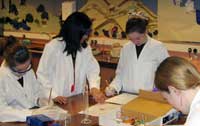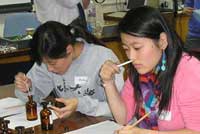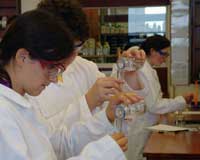Perfume chemistry, sexual attraction and exploding balloons: university activities for school Teach article
Tim Harrison and Dudley Shallcross from the University of Bristol, UK, describe some of the University’s activities to share a delight in chemistry with school students.
Bristol ChemLabS at the University of Bristol’s School of Chemistry provides activities to enthuse, excite, inspire and entertain large numbers of school students of all ages. These range from half-day conferences, workshops for school students and master classes for teachers, to two-week summer schools.
Why should a university provide activities for schools?
The two main reasons for putting so much energy and resources into these activities are to assist local, regional and national science teachers and to enthuse and inspire students. Both are hoped to promote the chemical sciences nationally rather than locally, as many local school students who choose to go to university will move away from home to study.
Science and Engineering Ambassadors training
An important aspect of the schools activities is the involvement of enthusiastic postgraduate students, who not only provide technical expertise but also act as role models for school students. The postgraduates receive voluntary training in working with children under the Science and Engineering Ambassadors Schemew1 (SEAS) at the University. All the activities are managed by an experienced teacher, giving the young chemists a chance to contribute to the public communication of science while providing them with advice and support. Around 80 of the University’s postgraduate chemists have undergone SEAS training in the last year.
Workshops for secondary school students

workshop with Dr Dimple
Patel
Several one-day and half-day workshops allow school students to visit the School of Chemistry to hear lectures and do practical work in the University teaching laboratories. Workshop topics include perfume chemistry, polymer chemistry, structure and bonding, and Grätzel cells
Using perfumes to introduce students to some of the more everyday applications of chemistry is proving very popular. We work with professional perfumer, John Stephen, to give students an understanding of the industry, historical developments, economics and science behind the sense of smell and the formulation of fragrances. The students then spend two hours perfecting their own perfume from a range of 24 components, which they then bottle and package. This workshop has been run at the University, in a school laboratory and in the perfume factory itself.

own perfumes
An extension of the perfume workshop involving a group of 30 students from four state schools is being developed. In this project, the students take perfume chemistry several stages further. They spend a day working with research chemists, using analytical equipment and techniques from thin layer chromatography to gas chromatography/mass spectrometry. Another day is spent at the University synthesising fragrance components, and on the final half-day, the students give a short talk as part of a conference on perfume chemistry, alongside academic speakers.
To allow school students to immerse themselves in chemistry for more than a day, Bristol ChemLabS runs one- and two-week summer schools at the University of Bristol, and provides activities for summer schools run by the science faculty. In July 2006, for example, a joint chemical sciences summer school for 17-year-olds will be held in conjunction with Trinity College Dublin, Ireland. The potential chemists will take part in biochemistry and pharmaceutical laboratory exercises, attend lectures with practicing research scientists, discuss the ethics of drug testing and visit pharmaceutical and other biochemistry companies. This is a pilot of what is hoped to be an annual two- or three-way student exchange between young chemists from European Union countries.
School chemistry conferences
So that students can visit a university and find out about aspects of chemistry that are not necessarily on a school curriculum, we organise afternoon chemistry conferences. Dramatic demonstrations with liquid nitrogen, colour changes and explosions are included and are always appreciated by students of all ages, as well as their teachers.

making aspirin at a summer
school
In January 2006, 240 17- and 18-year-old students attended an afternoon conference on Alzheimer’s disease, the action of aspirin and the chemistry of sexual attraction. In March, another 200 school students attended a food chemistry conference at which three-star Michelin chef Heston Blumenthal talked about the psychology of food and provided beetroot-flavoured sweets for the audience. Postgraduate students or young post-doctoral researchers often give a short scientific lecture, with help from the school teacher fellow to ensure that it is pitched at the correct level for the audience.
One recent lecture was on advances in synthetic bone chemistry, with a discussion of tissue engineering and artificial hip and elbow joints for the audience to handle. The young research chemists benefit from the communication experience and the school students see that not all academic chemists fit the stereotype of eccentric, out of touch men.
Master classes for secondary school teachers
To support regional teachers, we provide courses for teachers, student teachers and science technicians, working closely with the Science Learning Centre South Westw2 on some courses.
In the UK, chemistry is taught increasingly by biology graduates. One very successful course is therefore aimed at secondary school science teachers who are new to teaching chemistry, are not chemistry graduates and wish to explore the more dramatic demonstrations and practical lessons to enthuse their students. In the full-day course held in the undergraduate teaching laboratories, teachers have the opportunity to first see and then perform numerous experiments and discuss their use within the curriculum. The course also covers the risk assessment of the experiments.
The expected outcomes for the participants are an increase in the teachers’:
- Confidence in performing demonstrations or supervising practical lessons
- Range of practical lessons for enthusing students
- Understanding of health and safety issues relating to the practical lessons
- Use of such experiments with their students.
The practical sessions range from simple experiments such as the removal of the oxide layer from aluminium foil to demonstrate the reactivity of aluminium, the reactions of alkali metals with water and passing steam over magnesium, to the more involved organic experiments such as cracking paraffin oil, esterification and oscillating reactions. Other session include the correct handling of gas cylinders, how to set fire to balloons filled with hydrogen gas, how to make oxygen foam, slime-making investigations, exploding methanol vapour, burning acetylene (ethyne) foam, making nylon threads and the catalytic oxidation of ammonia.
Other activities
In addition to the regular activities described above, Bristol ChemLabS collaborate on many smaller ad hoc projects with schools. Examples include providing activities for science clubs or analysing infrared spectra of organic products made in schools.
Bristol ChemLabS not only works with secondary schools, but also visits primary schools to promote practical work in chemistry.
All school students visiting the School of Chemistry may collect careers information from professional bodies such as the Royal Society of Chemistryw3 and the Association of British Pharmaceutical Industriesw4.
Practicalities
The School of Chemistry at the University of Bristol is one of the biggest chemistry departments in the UK, one of only six in the country with the highest rating for research. It is also the only department to gain funding from the Higher Education Funding Council for England to create a centre for excellence in teaching and learning in practical chemistry – Bristol ChemLabS. Some of this money was used to appoint a qualified and experienced secondary school teacher as a school teacher fellow, to find ways in which the many resources of the University can be used to stimulate an active interest in chemistry by school students and pupils of all ages.
Most university science departments, of course, do not have these financial and staff resources, but this need not stop them from providing effective and inspiring activities for schools. We hope that this article and our websitew5 provide some useful ideas – and Bristol ChemLabS would be happy to offer advice.
Web References
- w1 – More information on the Science and Engineering Ambassadors Scheme.
- w2 – The Science Learning Centres form a national network, set up by the UK Department for Education and Skills and the Wellcome Trust, to provide continuing professional development for everyone involved in science education at all levels.
- w3 – The Royal Society of Chemistry is the largest organisation in Europe for advancing the chemical sciences.
- w4 – The Association of British Pharmaceutical Industries is the trade association of companies in the UK producing prescription medicines.
- w5 – Information on forthcoming and recent events organised by Bristol ChemLabS.
Review
This article describes a number of activities developed by a university department to engage with students and teachers at secondary school. It gives several useful ideas for the promotion of chemical sciences through workshops, conferences, master classes for teachers and other activities including the Science and Engineering Ambassadors Scheme.
The most important aspect of the activities described may be to attract students to the chemical sciences at university. However, another important aspect is that it may inspire teachers to make contact with their local chemistry (or other science/engineering) department to see what they can offer, to help them ‘sell’ and teach science to their students. The inclusion of web references adds to the general usefulness of the article.
This short article gives a concise description of activities, with just enough information to whet the appetite for any teacher interested in finding out more.
Marie Walsh, Republic of Ireland





